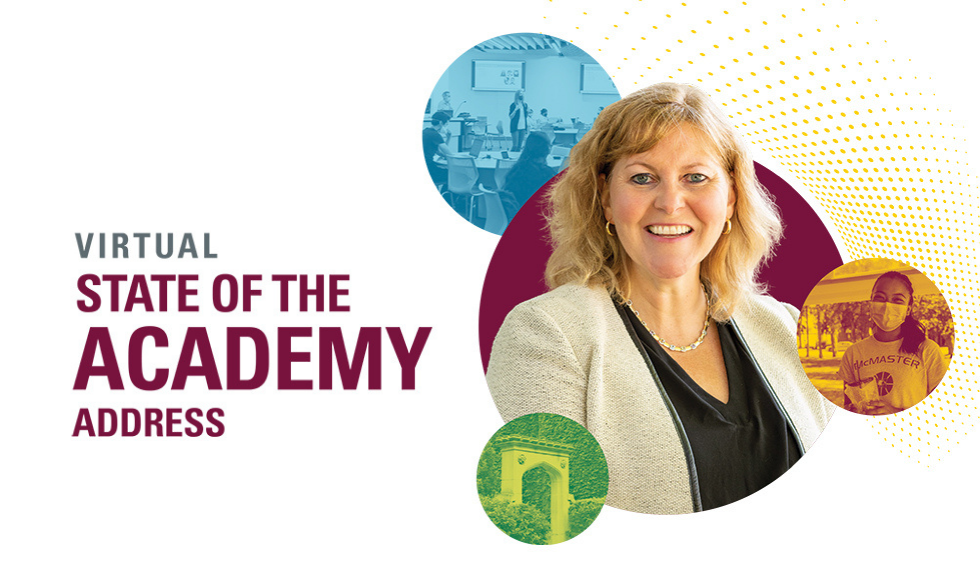Video and recap: Nov. 18 State of Academy address

In case you missed it, please find a recording of the event below, as well as a summary of key topics covered.
On Thursday, Susan Tighe, Provost and Vice-President, Academic, delivered McMaster’s virtual State of the Academy address, with over 800 participants in attendance.
During this event, Tighe offered a snapshot of where McMaster is at and where the community collectively is going. Faculties submitted key accomplishments to share as part of the address, and participants were invited to submit questions and upvote areas of interest.
In case you missed it, please find a recording of the event below, as well as a summary of key topics covered.
Please note that information shared during the November 18 State of the Academy address is accurate at the time of recording. For ongoing updates, please visit the Office of the Provost website.
KEY TAKEAWAYS:
Despite the challenges caused by the pandemic, McMaster has continued to flourish and grow, attracting world-class students and maintaining an ever-expanding research operation.
Enrolment overall has continued to increase even during the pandemic, and undergraduate enrolment has increased nearly 18 per cent over the last five years. Estimated total research income for 2020-21 is $374.6 million, including affiliated hospitals. Research funding has continued to increase throughout the pandemic.
Back to Mac
Tighe shared an overview of the vaccination mandate, including the process for developing policy and operational supports (such as testing centres and pop-up vaccination clinics on campus). Tighe also provided information on the Planning Decision Framework, which helps to guide planning decisions during the pandemic.
Since the start of the fall term, there have been nine reported cases of COVID-19 on campus and zero outbreaks.
Teaching & Learning Strategy
In May 2021, McMaster’s first ever Teaching & Learning Strategy – “Partnered in Teaching & Learning” was launched. The strategy includes four impact areas that will be an area of focus for the next five years: partnered and interdisciplinary learning; holistic and personalized student experience; inclusive excellence and scholarly teaching; and active and flexible learning spaces.
McMaster’s Black Excellence Cohort Hiring Initiative
In November 2020, McMaster announced a cohort hiring initiative that will see up to 12 appointments of emerging and established academics and scholars who will contribute to the advancement of Black excellence across all six faculties.
Indigenous Strategic Directions Plan
On September 30, the Indigenous Education Council and the McMaster Indigenous Research Institute (MIRI) launched the Indigenous Strategic Directions Plan. Both the President and Provost are committed to supporting and helping move forward the objectives in the plan, taking direction from Indigenous colleagues within the council, MIRI and across the university.
Mental health and well-being at McMaster
The Okanagan Mental Health and Well-being Task Force was formed to examine and provide recommendations to support the mental health and well-being of students, staff and faculty in the virtual and COVID-19 context. The group has met with over 180 stakeholders across campus and used feedback to inform the development of a podcast, virtual workshops and three toolkits.
Experiential and community-engaged learning and research
The University Fund has been used to create a sub-fund, the Strategic Alignment Fund (SAF) that is directly linked to the support of strategic goals and is meant to encourage units to collaborate. This fund provides between $5M and $10M to projects submitted by faculties and academic support areas for new programs, support of teaching and research infrastructure, student experience enhancement, and other initiatives.
Faculty and program reviews
Programs and faculties regularly undergo reviews led by the Office of the Provost, commonly at the end of a leader or dean’s first term. The reviews provide an opportunity to examine the program or Faculty’s governance, reporting structure, and operational processes. Current reviews starting this year:
- Office of International Affairs
- Graduate Studies
- Faculty of Engineering
- Faculty of Science


